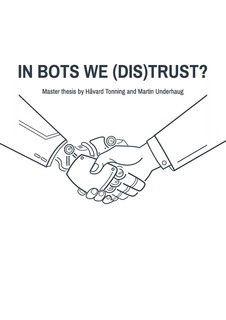In bots we (dis)trust?
Master thesis
Submitted version
Permanent lenke
http://hdl.handle.net/11250/2618905Utgivelsesdato
2019Metadata
Vis full innførselSamlinger
- Studentoppgaver (Business) [1035]
Sammendrag
As algorithms have evolved to become alternatives to human decision-makers in several domains, trust in algorithms becomes a crucial research topic. Indeed, research have shown that higher levels of trust lead to more reliance and faster adoption of technological artifacts. The intention of this thesis is to examine if people trust algorithms more than their human counterparts. This is done by constructing two experiments which each explore different manifestations of trust. First, we replicate the well-known trust game by Berg, Dickhaut and McCabe to investigate if people trust unknown individuals more than algorithms (‘Study 1’, n=1,600). Next, we employ the ‘Judge-Advisor System’—a paradigm used to study the impact of advice on human judgements—and examine if people rely more on a financial advice emanating from a financial advisor compared to a robo-advisor (‘Study 2’, n=350). All participants were recruited through the online crowdsourcing platform ‘Amazon Mechanical Turk.’
The results from ‘Study 1’ suggest that people trust algorithms more than people. However, this does not seem to translate to the context of financial advisory (‘Study 2’), where the participants relied equally on an advice given by a financial advisor and a robo-advisor. Moreover, age does not seem to affect the level of trust in algorithms nor robo-advisors and trust in algorithms seems to be independent of the information revealed about the algorithm.
Beskrivelse
Master's thesis in Economics

